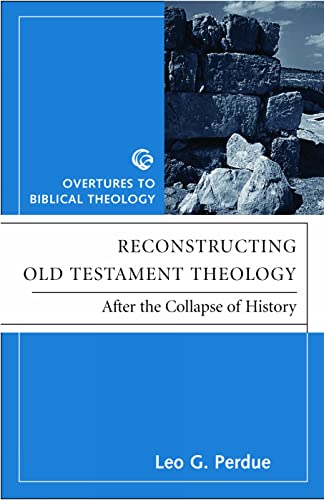RECONSTRUCTING OLD TESTAMENT THEOLOGY; AFTER THE COLLAPSE OF HISTORY
Written by Leo G. Perdue Reviewed By Hilary MarlowAs the sub-title suggests, this book moves beyond the conclusions of Perdue’s earlier book, The Collapse of History (Fortress, 1994), to examine more recent and emerging approaches to Old Testament theology, and in the author’s own words ‘to provoke both reflection and discussion’ (21). Although billed as a brief introduction, it represents a thorough engagement with some aspects of contemporary Old Testament theology, which offers as much, if not more, detail than the average undergraduate may require.
Following an introduction that sets out the current state of Old Testament theology (ch. 1), chapter 2 provides as overview of the different approaches represented by the Biblical Theology and History of Religion (Religionsgeschichtre) schools of thought, with a useful summary of developments by key scholars in each field. This chapter concludes, as do most of the following ones, by applying the approaches discussed to the Sock of Jeremiah.
Subsequent chapters provide overviews of a number of recent approaches to Old Testament theology. These include one on Jewish biblical theology as well as chapters on liberation and feminist theologies and on postmodernism and postcolonialism. In each chapter Perdue purports to concentrate on a few, representative works, chosen for the quality, clarity and provocative nature of their theologies. In reality the range and depth of material covered varies from chapter to chapter. So, for example, in the chapter on feminist historical interpretations, the work of Schüssler Fiorenza is dealt with at great length, and that of Carol Meyer more succinctly. In contrast, the chapter on the Tanakh discusses the work of Levenson (arguing against the concept of Jewish biblical theology), followed by brief coverage of a wide range of scholars who have undertaken some form of Jewish theology, and thus offers a broader introduction. This is more helpful for a relative newcomer to the field.
The material in each chapter is descriptive of scholar’s contributions rather than evaluative or critical, however Perdue concludes most chapters with a brief summary assessing the impact of the particular approach and/or raising his own points of concern (the exception is ch. 8 on the postcolonial text). Particularly helpful is his brief, but perceptive critique of postmodernism, which highlights important concerns about implementing wholeheartedly a postmodern approach. Whilst it might be helpful for the reader to have more critical evaluation of other approaches to Old Testament theology, this is not Perdue’s primary objective, since he is committed to appreciating the diversity found in post-WW2 scholarship.
The final chapter comprises Perdue’s articulation of his own paradigm for Old Testament theology, in the process of making assumptions that a conservative might want to question. In particular, his view of the ‘fallen state’ of the Bible begs a number of questions, as does his assertion that material from non-canonical texts should be given equal weight. However his four stages of theological interpretation offer a helpful, if not innovative model for engaging in biblical theology: identifying possible meanings of texts, articulating unifying and systematic themes, recognizing the historical interpretations of texts and engaging in critical reflection in the present context. Throughout this book Perdue has encouraged appreciation of diverse interpretations of the Bible and advocated dialogue among interpreters. Whether or not you agree with him, or the approaches he describes, this book provides a thought-provoking, detailed (and even at times dense) account of the diversities of Old Testament theology in the contemporary world.
Hilary Marlow
Cambridge







